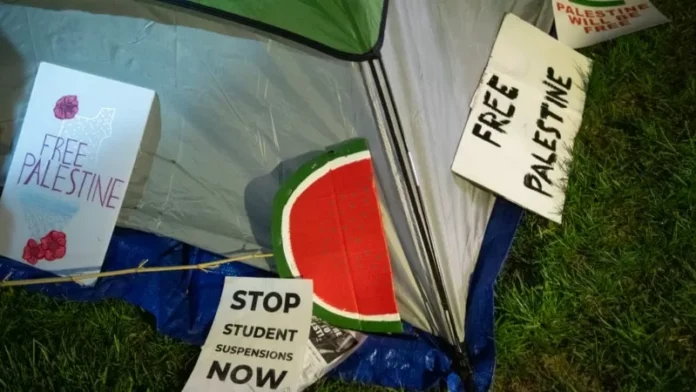Philadelphia, Pennsylvania has been the center of heated controversy and protests over the past weekend as pro-Palestinian demonstrators set up encampments at two prestigious universities in the city. The attempt to occupy school buildings at the University of Pennsylvania and the subsequent encampment at Drexel University led to a lockdown of school buildings and the arrest of several individuals.
The protests began when several hundred demonstrators marched from Philadelphia’s City Hall to west Philadelphia on Saturday afternoon. This led to approximately 75 protesters setting up an encampment at the Korman Quad on Drexel’s campus. While the demonstration started off peacefully, university officials were quick to address concerns about safety, citing instances of hateful speech and intimidating behavior at previous campus protests.
In a statement, Drexel President John Fry acknowledged the right to peaceful protest but also expressed concerns about maintaining a safe and respectful environment for all students and staff. As a result, university buildings were only open to those with clearance from Drexel’s Public Safety and non-community members were not allowed to trespass on campus.
These protests came just a day after an attempted occupation of a building at the University of Pennsylvania’s campus. Members of Penn Students Against the Occupation of Palestine had announced the action, urging supporters to bring items such as flags, pots, and pans. However, the university and city police quickly removed the demonstrators, resulting in 19 arrests. The university’s division of public safety also found alarming evidence, including lock-picking tools, homemade shields, and blocked entrances.
This incident comes on the heels of a two-week encampment at the University of Pennsylvania, which resulted in the arrest of 33 individuals. The university clarified that only a small number of those arrested were actually students, while the majority had no affiliation with the university.
These protests are reflective of the tensions and ongoing conflict between Israel and Palestine. The demonstrations at universities have been occurring for several weeks, with students calling for the cessation of financial ties with Israel. However, tensions escalated following a campus police crackdown at Columbia University in April.
Despite the arrests and disruptions, the protests have spread to numerous campuses across the United States, with nearly 3,000 people arrested in the past month. With summer break approaching, there have been fewer new arrests and campuses have been relatively calmer. However, colleges are still being vigilant for any disruptions during commencement ceremonies.
In fact, the ongoing conflict and protests were reflected in President Joe Biden’s speech to the graduating class at Morehouse College on Sunday. He acknowledged the voices of protest and called for an “immediate cease-fire” and the return of hostages taken by Hamas. He also spoke about the heartbreaking scenes in Gaza and the need for a resolution to the humanitarian crisis.
Meanwhile, the situation on the ground in Gaza remains dire as the Israel-Hamas war has already claimed the lives of over 35,000 people, according to the territory’s health ministry. The ongoing conflict began when Hamas and other militants stormed into southern Israel on October 7, killing over 1,200 people and taking hundreds more hostage. With Palestinian militants still holding around 100 captives, the urgent need for a peaceful resolution is evident.
In light of these events, it is important for universities and communities to come together and engage in open and respectful dialogue, rather than resorting to violence and disruptive protests. The principles of free speech and peaceful protest are crucial, but they should not overshadow the need for safety and respect for all individuals. As citizens of the world, it is our responsibility to stand in solidarity with those who are suffering and to work towards a peaceful resolution to the ongoing conflict in the Middle East.

